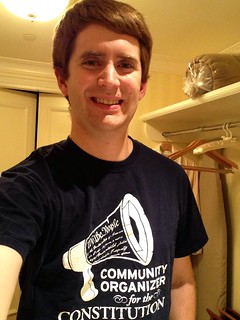[This post was originally published on The Living Room Tumblr.]
Later today, the U.S. House of Representatives will vote on an amendment that would repudiate and defund the executive and judicial branches’ secret, lawless abuse of the Patriot Act’s “business records” provision. It needs to pass.
I don’t use words like “lawless” lightly, nor do I regularly throw around allegations of “tyranny.” I’m a squishy centrist, not a firebrand radical! But I feel very strongly about this issue, as my followers on Twitter already know.
More on what I mean by that in a moment. But first: Here’s the text of the amendment, which is bipartisan – proposed by Justin Amash (R-Mich.), and co-sponsored by, among others, John Conyers (D-Mich.) and Jared Polis (D-Colo.). It says simply:
None of the funds made available by this Act may be used to collect tangible things pursuant to an order under section 501 of the Foreign Intelligence Surveillance Act of 1978 (50 U.S.C. 1861) if such things do not pertain to a person who is the subject of an investigation described in such section.
Here is Rep. Amash’s fact sheet. I urge you to call your congressperson and make sure they are voting “Yes.” (I tweeted at mine, and will follow up with a call.)
For me, this issue isn’t just about metadata spying; it’s about the constitutional order and the rule of law. I believe the Obama Administration (like the Bush Administration before it) and the FISA Court are behaving in a fundamentally unlawful manner. Passage of the Amash amendment would explicitly tell them to stop it. Conversely, failure to pass the amendment would be widely seen, fairly or unfairly, as an implicit ratification of what they are doing.
“What they are doing,” in my view, is unlawfully gutting – in secret – the limits on their power that Congress enshrined into law when it passed the “business records” provision of the Patriot Act. While I don’t doubt the good intentions of the people involved, what has occurred amounts to a form of classified collusion between the executive and judicial branches, arrogating to themselves an effectively unlimited power of metadata-collection power under 50 U.S.C. § 1861, despite the fact that § 1861 itself imposes limits on that power.
To be clear, my primary argument is not that the NSA’s FISA-authorized spying on every American’s telephone metadata violates the Fourth Amendment. I personally believe that it should be deemed to do so, but I recognize that current precedents suggest it probably does not. Fine. Put that aside for a moment. Instead, my focus is on a question, not of constitutional interpretation, but of statutory interpretation. And whatever you think of the constitutional question – or, for that matter, the underlying substantive question (i.e., is this spying program wise or unwise?) – I urge you to join me in focusing on the statutory issue for a moment. Because, for the life of me, I cannot see how there’s a colorable argument that the Obama Administration and the FISA Court are doing anything other than blatantly violating the law in their (secret!) interpretation of the relevant statute.
The statute I’m referring to, and the statute Rep. Amash wants to amend, is the so-called “business records” provision of the Patriot Act, 50 U.S.C. § 1861. More specifically, § 1861(b)(2)(A). The pertinent text states:
Each application [to the secret FISA court for an order authorizing metadata collection] under this section— …
(2) shall include—
(A) a statement of facts showing that there are reasonable grounds to believe that the tangible things sought are relevant to an authorized investigation (other than a threat assessment) conducted in accordance with subsection (a)(2) to obtain foreign intelligence information not concerning a United States person or to protect against international terrorism or clandestine intelligence activities, such things being presumptively relevant to an authorized investigation if the applicant shows in the statement of the facts that they pertain to—
(i) a foreign power or an agent of a foreign power;
(ii) the activities of a suspected agent of a foreign power who is the subject of such authorized investigation; or
(iii) an individual in contact with, or known to, a suspected agent of a foreign power who is the subject of such authorized investigation; and
(B) an enumeration of the minimization procedures adopted by the Attorney General under subsection (g) that are applicable to the retention and dissemination by the Federal Bureau of Investigation of any tangible things to be made available to the Federal Bureau of Investigation based on the order requested in such application.
(Emphasis added, natch.)
Those “minimization procedures” are what you’ve read a lot about in the press, if you’ve followed this issue: the idea that the information obtained is placed into some sort of sealed database, which then can’t be queried without another FISA order, with more stringent requirements. In other words, the NSA is hoovering up all this information, but it supposedly can’t look at it without going back to the FISA court. I have deep concerns about the long-term viability of such a “Chinese wall” within a single branch of government – in my view, such “minimization procedures” practically scream “abuse me!” – but, again, let’s put that aside for the moment. Let’s assume, for the sake of argument, that the minimization procedures are completely adequate, and that no abuse is taking place, or will ever take place. (Riiiiight.) Even making such an implausible assumption, my statutory argument would still stand. I would still believe that the executive and judicial branches are acting unlawfully.
Why? Because of the pesky word “and” at the end of § 1861(b)(2)(A)(iii). The statute requires that the government’s application for a FISA metadata-collection order “shall include" both the "minimization procedures” required by subsection (B) and the “relevance” showing required by subsection (A). Thus, by law, according to this duly enacted Act of Congress, the NSA can’t just put anything it wants into a secret database and worry about relevance later, when it queries that database. The NSA can only put things into the database in the first place if those “things…are relevant to an authorized investigation.” And the FISA court can only approve the NSA’s application, and issue the requested order, “if the judge finds that the application meets the requirements” of the statute, including the “relevance” requirement.
That’s not my opinion; it’s what the Patriot Act says. This is the governing statute, and its text is crystal-clear on this point: the initially collected information must be “relevant,” or no metadata-collection order may lawfully issue. End of story.
So, how have the executive and judicial branches (secretly) interpreted this statutory limit on their power? Absurdly, indefensibly, and lawlessly. From the recent New York Times article headlined “In Secret, Court Vastly Broadens Powers of N.S.A.”:
Under the new procedures passed by Congress in 2008 in the FISA Amendments Act, even the collection of metadata must be considered “relevant” to a terrorism investigation or other intelligence activities.
The court has indicated that while individual pieces of data may not appear “relevant” to a terrorism investigation, the total picture that the bits of data create may in fact be relevant, according to the officials with knowledge of the decisions.
First of all, let me pause and point out something very important. The very notion that we’re learning what the law of the land is from “officials with knowledge of the decisions” – i.e., the fact that We The People do not have access to the governing laws of our nation, because we are forbidden from having “knowledge of the decisions” that determine how the laws are authoritatively interpreted – is deeply disturbing, to say the least. While certain facts must at times be kept secret because we’re battling a cunning and deadly foe in Islamist terrorists, the law itself must never be kept secret, or we no longer have the “republic, if you can keep it” that Ben Franklin promised us.
Unfortunately, that secret-court business is baked into the cake. It was written into the statute when Congress passed the Patriot Act. It desperately needs to be fixed, but for now, it’s the law.
What isn’t the law is what the Obama Administration and the FISA Court have done with their secret powers. If the Times’s “officials with knowledge of the decisions” are accurately summarizing the decisions, those powers are unquestionably being abused. The notion that “while individual pieces of data may not appear ‘relevant’ to a terrorism investigation, the total picture that the bits of data create may in fact be relevant” is a completely indefensible interpretation of § 1861(b)(2)(A). That is not what the statute says. It is not what the statute means. It is not the law.
In describing what sort of “tangible things” can lawfully be collected, the statute doesn’t say the government must have a passing suspicion or vague hope that “the tangible things sought, when mixed with other tangible things, might create a total picture that may in fact be relevant to an authorized investigation.” On the contrary, it says the government must have “reasonable grounds to believe that the tangible things sought are relevant to an authorized investigation.” That may be a weak standard, but it’s a standard nonetheless, and it can’t simply be ignored, or effectively read out of the statute. Yet that’s what happened.
The interpretation given to that statutory language by the Obama Administration and the FISA Court, as reported by the Times and others (and as made rather obvious by the leaked Verizon order), cannot be reconciled with the statutory language itself. It can only be arrived at by gutting the statute’s “relevance” requirement to the point of making it meaningless.
I’m no constitutional lawyer, nor did I stay at a Holiday Inn Express last night. But I know a little bit about principles of statutory interpretation, both from studying them in law school and from citing them many times in my civil litigation practice. And one of the core principles of statutory interpretation is that, if at all possible, judges are supposed to give meaning to every word and phrase and provision of the statute they are interpreting. Occasionally there are irreconcilable inconsistencies that have to be addressed, but barring that, judges aren’t supposed to just disregard a portion of the statute if they deem it inconvenient, or gut a statutory provision to the point where it no longer has meaning. Relatedly, they also aren’t supposed to interpret statutes to create “absurd results,” if such an outcome can possibly be avoided.
Here, the FISA Court – in rubber-stamping the Bush and Obama Administrations’ non-compliant applications to indiscriminately collect metadata – has violated both of these principles. It has effectively read the “relevance” requirement out of the statute, and it has created an absolutely absurd result.
If the NSA is allowed to, potentially, collect every American’s phone metadata, then, quite obviously, there is no effective “relevance” limit on its collection of such information. How can there possibly be “reasonable grounds to believe that the tangible things sought are relevant to an authorized investigation” when “the tangible things sought” are the phone records of each and every Verizon customer (or AT&T customer, or Sprint customer – whatever). Answer: there cannot be such “reasonable grounds,” unless you believe that literally every piece of metadata in existence is potentially “relevant” (because “the total picture that the bits of data create may in fact be relevant”), in which case the “relevance” provision has lost all meaning and serves no purpose in the statute. Thus, to interpret the statute in such a fashion is to violate the core principle of statutory interpretation that says you must attempt to give meaning to every word, phrase and provision.
This is not a debatable interpretation, in my judgment. It is simply a wrong interpretation. The FISA Court (or FISA-gûl, if you prefer) has adopted the erroneous, indefensible construction of 50 U.S.C. § 1861(b)(2)(A) urged by the Bush and Obama Administrations in secret, one-sided, non-adversarial proceedings.
I believe this incorrect interpretation would be struck down by the U.S. Supreme Court, if it ever got there – but the deck is stacked against allowing that to happen, as the Times expains:
The 11-member Foreign Intelligence Surveillance Court, known as the FISA court, was once mostly focused on approving case-by-case wiretapping orders. But…it has quietly become almost a parallel Supreme Court, serving as the ultimate arbiter on surveillance issues and delivering opinions that will most likely shape intelligence practices for years to come …
Unlike the Supreme Court, the FISA court hears from only one side in the case — the government — and its findings are almost never made public. A Court of Review is empaneled to hear appeals, but that is known to have happened only a handful of times in the court’s history, and no case has ever been taken to the Supreme Court. In fact, it is not clear in all circumstances whether Internet and phone companies that are turning over the reams of data even have the right to appear before the FISA court.
Bottom line? The executive branch advanced an indefensible legal interpretation of an Act of Congress, gutting the limits that Congress placed on the executive’s power. The FISA Court, in a setting where it only heard from one side, adopted that indefensible interpretation. Bow it’s effectively the law of the land – and we wouldn’t even know about it, if not for Edward Snowden’s illegal leaks to The Guardian.
Well, we’d have some inkling, thanks to Senators Mark Udall (my senator!) and Ron Wyden. But only a vague inkling. We now know that this issue is precisely what the senators were talking about when they wrote to Attorney General Eric Holder in 2011 and 2012, and said, vaguely – because, thanks to secrecy laws, they were forbidden from revealing the governing laws of America to the citizens of America – that section 215 of the Patriot Act (as §§1861 and 1862 are also known) was being contorted beyond all recognition:
[S]ection 215, which is a public statute, has been the subject of secret legal interpretations. … We believe most Americans would be stunned to learn the details of how these secret court opinions have interpreted section 215 of the Patriot Act. As we see it, there is now a significant gap between what most Americans think the law allows and what the government secretly claims the law allows. This is a problem, because it is impossible to have an informed public debate about what the law should say when the public doesn’t know what its government thinks the law says.
As we have said before, we believe that it is entirely legitimate for government agencies to keep certain information secret. Americans acknowledge that their government can better protect national security if it is sometimes allowed to operate in secrecy and as such, they do not expect the Obama Administration to publish every detail about how intelligence is collected any more than early Americans expected George Washington to tell them his plans for observing troop movements at Yorktown. However, in a democratic society – in which the government derives its power from the consent of the people – citizens rightly expect that their government will not arbitrarily keep information from them. Americans expect their government to operate within the boundaries of publicly-understood law, and as voters they have a need and a right to know how the law is being interpreted, so that they can ratify or reject decisions made on their behalf. To put it another way, Americans know that their government will sometimes conduct secret operations, but they don’t think that government officials should be writing secret law.
Exactly, Senators Udall and Wyden. Exactly. And this is why I get so worked up: not so much because of the metadata-spying itself (though that’s bad enough!), but because of the underlying structural threat to the constitutional order. It fundamentally undermines the rule of law, and the very fabric of republican government, for the executive and judicial branches of the federal government to, in essence, secretly change the law from something that Congress passed (metadata collection limited by a “relevance” requirement) to something that Congress deliberately did not pass (metadata collection with no effective limit). If that can happen, and not be corrected, then we are in deep, deep trouble.
I use the word “tyranny” because, regardless of the motivations (or party affiliations) of the people presently in power, a nation in which Acts of Congress can be indefensibly contorted, through secret judicial “interpretation,” into something directly contrary to the will of Congress, is not a nation governed according to principles of republicanism or representative democracy. It is a nation which has, in the name of fighting terrorism, abandoned all pretense of checks and balances with respect to security and surveillance policy. And that’s just not okay.
I’ve been focused on this narrow – but critical – issue of the interpretation of 50 U.S.C. § 1861’s “relevance” provision since the very day the NSA metadata-spying story broke, June 5. That evening, I basically erupted on Twitter in a fit of civil-libertarian rage:
In addition to suggesting “impeachment should be considered,” I also tweeted, “So help me, if I have to vote for f***ing Rand Paul in 2016 to drop this insanity, I will. Enough is enough.” (My point being, this is much more important than typical policy differences; it goes to the heart of our structure of government itself.)
And then, a Star Trek reference:
In response to the inevitable backlash against the “impeachment” and “Rand Paul” comments, I conceded, “I’m a bit worked up. Having a @sullydish moment.” I also clarified, “Look, it’s not like I’m committing to vote for Rand Paul here. #shudder. I’m just trying to emphasize how much this matters.” As for impeachment:
I said “should be considered.” I’m worked up, but I chose my words carefully. Not saying “impeach!” But not off the table. THIS MATTERS. If we won’t even consider impeachment for exec & judicial officials who won’t explain legal basis for what appears facially to be an indefensible interpretation of the law that allows them to illegally spy on all Americans, then why does impeachment exist?
About a month later, after the Times article, I framed the issue a bit less controversially, in terms of my own future votes:
And now here we are today. Unfortunately, the continued “existence of secret federal common law” isn’t up for a vote, at least not yet. Only the metadata-spying regime – the one specific, known example of “secret federal common law” leading to an obviously-wrong result – is before the House today.
Even so, the Amash amendment is important because, as I said before, its passage would serve as an explicit repudiation of the executive and judicial branches’ lawless quasi-repeal of the statute’s relevance provision. By contrast, and perhaps even more importantly, a vote against the amendment would likely be touted by the dissembling demagogues on the other side of this issue as a definitive judgment that Congress has ratified this absurd interpretation. Given the insular and risk-averse culture of D.C., a defeat today could shut down further efforts to address this issue, while a victory today could invigorate those efforts.
So, the amendment needs to pass. Call your congressperson. Let’s do this.









